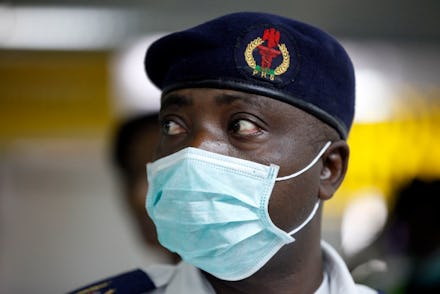The Deadliest Ebola Outbreak in History Has Expanded to Yet Another Country

The news: The largest Ebola outbreak in history appears to have expanded to the Democratic Republic of Congo, the fifth country in this current epidemic, according to CNN. Authorities confirm that two cases have resulted in deaths in Djera in northern Equateur province, reports Reuters.
A raging Ebola epidemic has infected 2,615 people in West Africa since March and killed at least 1,427 of them, but so far it has been largely confined to Guinea, Sierra Leone, Liberia and Nigeria. Now the disease has popped up in DR Congo, hundreds of miles away. In total, national health authorities suspect Ebola has caused at least 13 deaths there and infected many more.
However, there's another factor at play now: World Health Organization scientists are still conducting tests on samples taken from patients, but preliminary evidence released on the Twitter account indicates that the outbreak in DR Congo is a different strain of the virus. That would make the two outbreaks unrelated, meaning authorities now have two major Ebola epidemics to worry about instead of one.
The background: Congo has had six previous outbreaks of Ebola virus disease since the first known human infection in 1976, which have killed hundreds of people. A 62-mile-radius quarantine zone is being put in place to contain the new threat. CNN's Faith Karimi reports that "[a] major outbreak in Congo would be catastrophic; it shares borders with nine nations, including Rwanda, Uganda and Burundi."
Image Credit: Health Map
Currently, contagious disease experts worry that as the outbreak in West Africa expands, it may overwhelm regional health authorities and spread across the continent. Lancaster University bioinformatician Derek Gatherer told Vox, "The worst-case scenario is that the disease will continue to bubble on, like a persistent bushfire, never quite doused out... It may start to approach endemic status in some of the worst-affected regions."
It's not clear where the Congolese outbreak began, but news began filtering out of the country last week of a mass outbreak of hemorrhagic gastroenteritis, which the WHO denied was Ebola. Djera is a collection of extremely rural villages, more than 745 miles from the capital of Kinshasha and more than half that from the provincial capital. Its distance from urban areas will pose a serious obstacle to moving in the resources and personnel necessary to contain Ebola.
Image Credit: AP
What it means: Two separate outbreaks on the continent continue to make 2014 a fantastically bad year for Ebola.
Since DR Congo has handled so many outbreaks before, the prospects for containing the disease are somewhat better than in West Africa, where the disease has surprised health officials and hits an already overburdened health system with few resources. But the situation remains very grim. According to the WHO, more than 225 health workers have become infected since March: